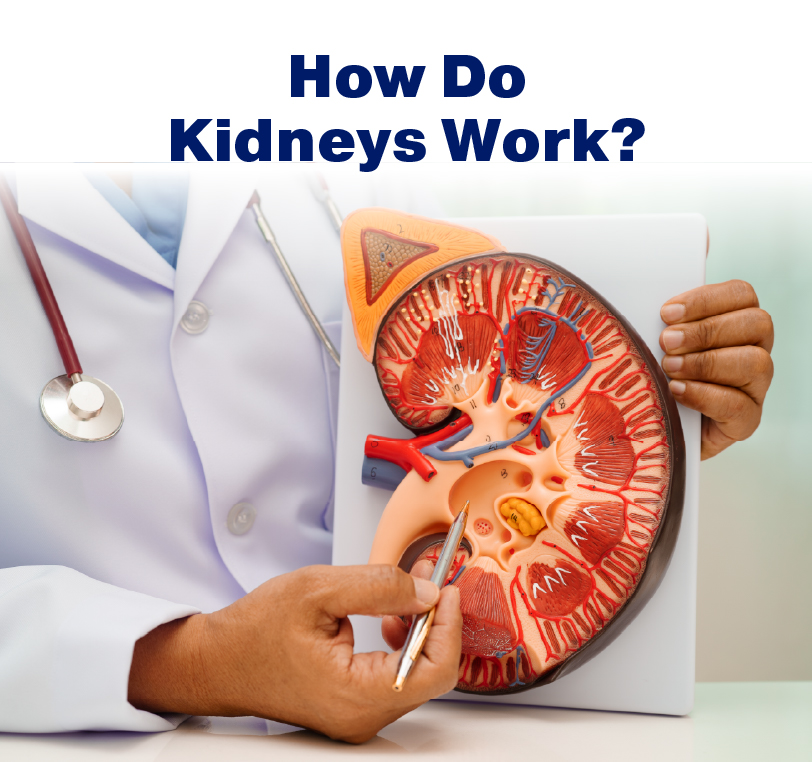How Kidneys Work: Functions, Health Tips & When to Get a Kidney Function Test
How Do Kidneys Work?
A Guide to Kidney Function & Health
Our kidneys are remarkable organs working nonstop to maintain balance in the body. Though small, each is about the size of a fist, and their role is huge. From filtering waste to regulating blood pressure and supporting bone health, kidneys keep many critical systems functioning properly.
Understanding how your kidneys work is not just a biology lesson; it is a key part of protecting your health over the long term. If it has been a while since your last kidney check-up, it may be time to schedule one.
What Do the Kidneys Do?
You have two kidneys located on either side of your spine, just below the rib cage. Each kidney contains nearly one million tiny filters called nephrons, which clean your blood of waste and excess substances.
Filtering Your Blood: Blood enters the kidneys through the renal artery and passes through nephrons. Helpful substances like glucose, amino acids, and some water are reabsorbed into the bloodstream. Waste products and surplus fluids are removed and turned into urine.
Balancing Fluids & Electrolytes: Kidneys regulate water and minerals such as sodium, potassium, calcium, and phosphate. Keeping these levels stable is crucial for proper heart rhythms, muscle function, and hydration.
Regulating Blood Pressure: The kidneys produce a hormone called renin. When blood flow drops, renin signals the body to adjust blood vessel tightness and salt retention to restore healthy blood pressure.
Supporting Bone & Blood Health: Kidneys activate vitamin D, which helps the body absorb calcium to strengthen bones. They also release erythropoietin, a hormone that stimulates bone marrow to produce red blood cells.
Tips for Maintaining Healthy Kidneys
-
Know your health chart: Diabetes, high blood pressure, age over 40, or family history means extra caution.
-
Watch for warning signs: Swelling, fatigue, urination changes, or high blood pressure need medical attention.
-
Get Regular Kidney Tests (KFT): Regular checks like creatinine, eGFR, BUN, and urine protein catch issues early.
-
Stay Hydrated: Drink enough water, but follow your doctor’s advice if needed.
-
Eat Healthy: Focus on fruits, veggies, lean protein; limit salt and processed foods.
-
Exercise Regularly: Stay active for overall kidney support.
-
Control Blood Pressure & Sugar: Manage these to protect your kidneys.
Common kidney function tests include:
-
Serum Creatinine: Measures creatinine, a waste product filtered by the kidneys. Elevated levels can indicate reduced kidney function.
-
Estimated Glomerular Filtration Rate (eGFR): Estimates how well the kidneys are filtering blood.
-
Blood Urea Nitrogen (BUN): Measures nitrogen waste in the blood to assess kidney performance.
-
Urine Albumin-Creatinine Ratio: Detects protein leakage in urine, often the earliest sign of kidney damage.
When Should You Get Tested?
You do not need to wait for symptoms to appear. Proactive testing is especially important if you:
If you notice symptoms like unexplained swelling, persistent fatigue, or changes in how often or how much you urinate, you should see a doctor and consider kidney testing.
Take Charge of Your Kidney Health
Kidneys are essential for filtering waste, regulating blood pressure, maintaining fluids, and supporting bones and blood cells. Because kidney diseases often show no early symptoms, regular check-ups and kidney function tests are vital, especially if you have risk factors. Being informed and testing at the right time can help catch problems early and protect your health for years to come.
